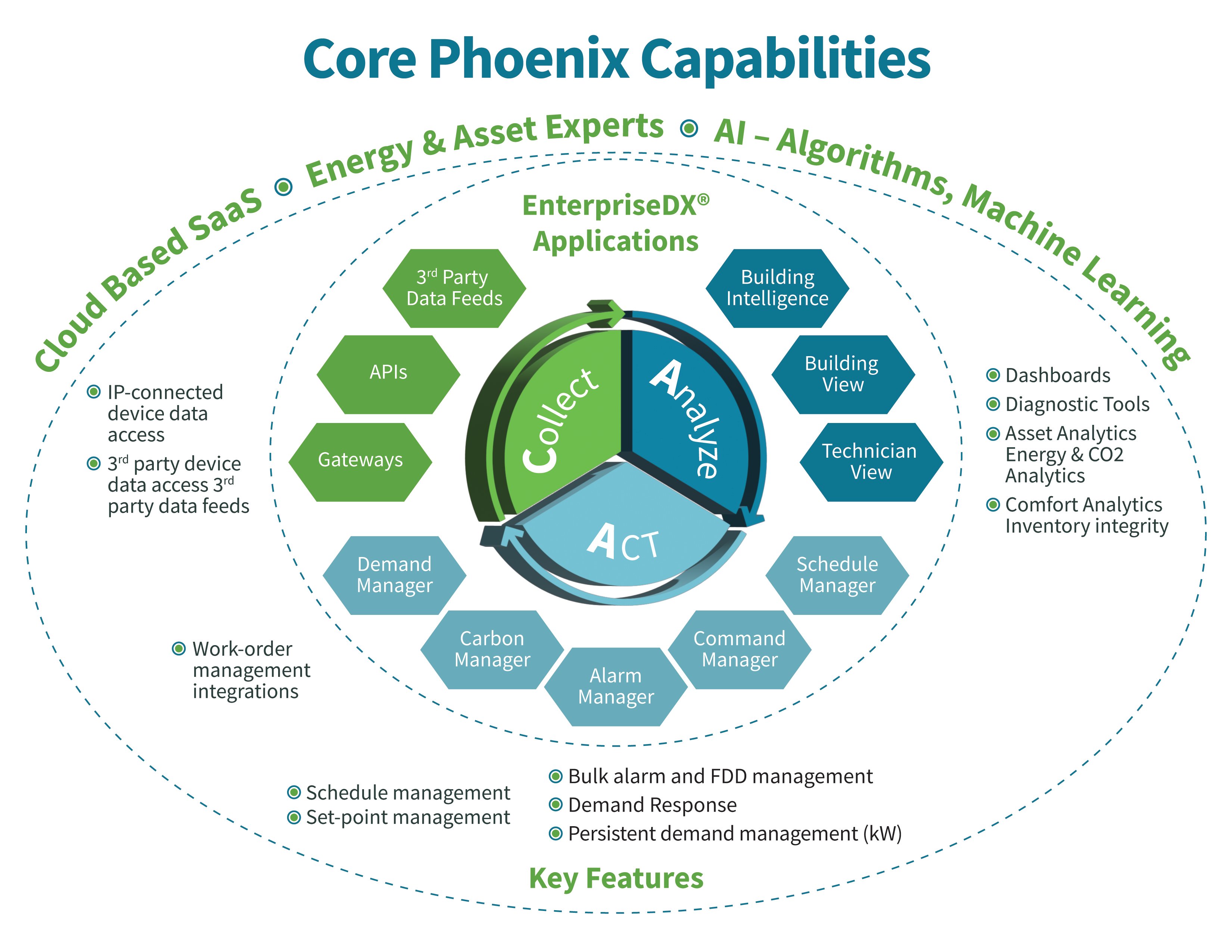Share this
Why Data for AI Training is Crucial in Multi-Site Building Portfolios
by Ron Rau on Aug 3, 2023

Introduction
In the era of rapidly advancing technology, Artificial Intelligence (AI) is revolutionizing numerous industries, and the field of facilities management is no exception. As facilities managers strive to optimize indoor air quality, enhance occupant comfort, and reduce carbon emissions in multi-site building portfolios, harnessing the power of AI becomes imperative. However, the effectiveness of AI is heavily reliant on data, and the availability of large and diverse datasets is critical for training AI models to make accurate predictions and informed decisions. Bad data can create non-optimal decisions. In this article, we will explore the significance of data for AI training and its role in addressing the concerns of facilities managers regarding indoor air quality, occupant comfort, and carbon emissions reduction.
The Importance of Indoor Air Quality
Indoor air quality has a profound impact on the health, well-being, and productivity of building occupants. Poor indoor air quality can lead to a range of adverse effects, including respiratory problems, allergies, and reduced cognitive function. Facilities managers understand the significance of maintaining optimal air quality and are constantly striving to monitor and improve it.
AI-powered systems can play a vital role in continuously monitoring indoor air quality by collecting data from various sensors, such as temperature, humidity, carbon dioxide levels, and volatile organic compounds. The more data available for AI training, the more accurately the system can identify patterns, detect anomalies, and provide real-time insights to facilities managers. With a robust AI model trained on a large dataset, potential issues can be anticipated and addressed proactively, ensuring healthier and more comfortable indoor environments.
Enhancing Occupant Comfort
Occupant comfort is a key consideration for facilities managers as it directly impacts the satisfaction, productivity, retention of building occupants, and optimal customer shopping experiences. AI can assist in optimizing comfort levels by analyzing data from numerous sources, such as occupancy sensors, temperature sensors, and user feedback.
By training AI models with diverse datasets, facilities managers can gain a comprehensive understanding of the factors that influence occupant comfort. This includes identifying optimal temperature and humidity ranges, evaluating the impact of lighting conditions, and even considering personal preferences. The AI system can then make intelligent adjustments to heating, ventilation, and air conditioning (HVAC) systems, lighting controls, and other building components, creating personalized and comfortable environments for occupants.
Reducing Carbon Emissions
With the growing concern for environmental sustainability, facilities managers are under pressure to reduce carbon emissions associated with building operations. AI can serve as a powerful tool in achieving this goal by analyzing energy consumption patterns, optimizing energy usage, and identifying areas for improvement.
To enable effective energy management, AI systems require a significant amount of training data. By integrating data from multiple buildings within a portfolio, facilities managers can gain insights into energy usage patterns, identify energy-saving opportunities, and develop predictive models for demand and consumption. AI algorithms can help optimize HVAC systems, lighting schedules, and other energy-consuming devices, resulting in substantial energy savings and reduced carbon emissions across multi-site portfolios.
The Role of Data in AI Training
The efficacy of AI systems heavily relies on the quantity and quality of training data. The more diverse and extensive the dataset, the better the AI model can generalize and make accurate predictions. In the context of multi-site building portfolios, the availability of data from various locations and building types enables AI models to capture the nuances and complexities of different environments.
By leveraging a large dataset, facilities managers can ensure that their AI systems account for a wide range of factors including building size, construction materials, occupant demographics, and regional variations. This comprehensive training enables AI models to provide reliable insights and recommendations specific to each building within the portfolio.
Furthermore, as AI systems continuously learn and adapt based on real-time data, facilities managers can benefit from ongoing improvements and refinements in their decision-making processes. Over time, AI models become more accurate and effective, leading to optimized indoor air quality, enhanced occupant comfort, and reduced carbon emissions across the entire multi-site portfolio.

Phoenix Energy Technologies has been providing smart building IoT analytics solutions to customers, leveraging our proprietary CAA closed loop framework (collect-analyze-act), for more than 15 years. AI, quite simply, allows us to augment our existing core closed-loop capabilities to be better, faster, more dynamic, and advance towards an autonomous and adaptive closed-loop system.
Conclusion
In the realm of facilities management, the utilization of AI technology holds immense potential for improving indoor air quality, enhancing occupant comfort, and reducing carbon emissions. However, the success of AI systems hinges on the availability of large and diverse accurate datasets for training. By harnessing the power of accurate data, facilities managers can ensure that AI models accurately capture the intricacies of multi-site building portfolios, leading to more informed decisions, proactive maintenance, and ultimately, healthier and more sustainable environments. Phoenix Energy Technologies and our diverse accurate datasets allow for quicker training of the data for AI purposes.
As the field of AI continues to advance, it is crucial for facilities managers to recognize the importance of data collection and utilization. By investing in comprehensive data collection strategies and implementing robust AI training processes, facilities managers can unlock the full potential of AI technology and pave the way for a smarter, more sustainable future in multi-site building management.
Share this
- Facilities Management (91)
- Energy Management (69)
- Company News (49)
- Smart Buildings (37)
- Retail (36)
- Building Management (24)
- Building Automation Systems (21)
- Sustainability (20)
- Energy Demand Management (19)
- EEI (15)
- Adaptive Energy Management (14)
- Grocery (14)
- demand response (14)
- Artificial Intelligence (12)
- Data Integration and Visibility (10)
- HVAC IQ (10)
- COVID-19 (8)
- Customer Spotlight (8)
- Carbon Management (7)
- Refrigeration Optimization (7)
- Setpoints and Temperatures (7)
- Equipment Maintenance (6)
- Operational Efficiency (6)
- Ask Ron (5)
- Asset Manager (5)
- Finance and Procurement (5)
- IoT and Digital Transformation (5)
- Awards (4)
- Comfort (4)
- Energy & Store Development (4)
- Safety and Compliance (4)
- Demand Charge Management (3)
- Energy Management System (3)
- Lifecycle Asset Management (3)
- Premium Services (3)
- Refrigeration IQ (3)
- Automated Demand Response (2)
- ConnexFM (2)
- Customer Service (2)
- HVAC Vendor Management (2)
- Load Shedding (2)
- Technician View (2)
- AIM Act (1)
- ALD (1)
- Analytics (1)
- Commissioning (1)
- Data (1)
- Data Integration and Visualization (1)
- EMS (1)
- Knowledge Center (1)
- OSHA (1)
- asset management (1)
- January 2026 (1)
- December 2025 (1)
- November 2025 (1)
- October 2025 (2)
- September 2025 (1)
- August 2025 (3)
- July 2025 (1)
- June 2025 (1)
- May 2025 (2)
- March 2025 (2)
- February 2025 (1)
- January 2025 (2)
- December 2024 (2)
- October 2024 (1)
- September 2024 (1)
- August 2024 (2)
- June 2024 (2)
- April 2024 (2)
- March 2024 (2)
- January 2024 (1)
- December 2023 (1)
- October 2023 (2)
- September 2023 (2)
- August 2023 (2)
- July 2023 (1)
- May 2023 (2)
- April 2023 (2)
- March 2023 (3)
- February 2023 (1)
- January 2023 (1)
- December 2022 (1)
- November 2022 (2)
- October 2022 (2)
- September 2022 (1)
- May 2022 (2)
- April 2022 (1)
- March 2022 (3)
- February 2022 (2)
- January 2022 (4)
- December 2021 (2)
- November 2021 (3)
- October 2021 (1)
- September 2021 (3)
- August 2021 (4)
- July 2021 (1)
- June 2021 (2)
- May 2021 (1)
- January 2021 (2)
- December 2020 (2)
- November 2020 (2)
- October 2020 (3)
- September 2020 (4)
- August 2020 (3)
- July 2020 (2)
- June 2020 (3)
- May 2020 (3)
- April 2020 (5)
- March 2020 (5)
- February 2020 (4)
- January 2020 (4)
- December 2019 (4)
- November 2019 (3)
- October 2019 (4)
- September 2019 (5)
- August 2019 (4)
- July 2019 (4)
- May 2019 (2)
- April 2019 (3)
- February 2019 (1)
- December 2018 (1)
- November 2018 (1)
- October 2018 (3)
- September 2018 (3)
- August 2018 (3)
- July 2018 (3)
- June 2018 (3)
- May 2018 (1)
- June 2015 (1)
- March 2013 (1)
- January 2013 (1)
- December 2011 (1)
- October 2011 (1)
- September 2011 (1)


